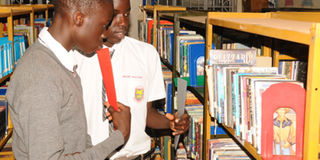Building libraries of love

Students look at the books in one of the Libraries of Love that she has created. Photo by Colleb Mugume.
Trudy Marshall wears a smile when she talks of the subject ‘reading’ and her love for it is explains why she is emotional when talking about it. The soft spoken, book enthusiast depicts the epitome of gentility. A lover of fiction, for Marshall, books are a learning experience.
“I can read a book in one night, however big it is because I have something strong that keeps me glued to the book even until I am done with it,” she says. Growing up in a small town with lots of time at her disposal, reading was the only way to kill the boredom. It is no wonder that creating such an opportunity for other children came naturally to her. Today, nothing could be more satisfying for Marshall than being the executive director of ‘ Libraries of Love, an NGO that establishes libraries in schools to encourage reading thus nurturing the reading culture across the country. A visit to one such library at Mengo Senior Secondary School bring us face to face with rows of well organised books in clearly marked shelves spreading sections such as fiction, sciences, nature. There are 36 such libraries in schools across the country.
Coming to Uganda
While backpacking around the world, Marshall came to Uganda to see the sights in 2001. She visited Namirembe Primary School and noticed their lack of reading books.
“The family I stayed with had children who studied at Namirembe Primary School and because of my passion for education, I decided to accompany them to school hoping to read some of their books, but could not find any in the library. I was shocked,” she says, adding that watching the students read a wonderful thing.
She then decided to find ways of availing books for children to read.
“Because they had not had libraries before, it was difficult for them to adjust to having one. I mobilised and got them reading material that I stocked in a room that was provided to me by the administration, they welcomed my library idea,” she notes.
After finally setting up a library there in 2005, Marshall says she had no hopes of setting up more, however her plans changed after an encounter at church.
“When I went to Pearl Heaven Church in Mbale, God charged my heart to establish more. A school there asked for a library which I offered. I have been establishing libraries since then; I live in Uganda for six months and there rest of the year I go to America to raise funds and lobby for book donations,” she says.
Taking libraries to the schools
Marshall who says when she started the initiative; she wanted the African child to have a library as nice as an American child, prides in her 10 years’ experience as a librarian which she says has helped her to get as many books as she wants.
“While I was still a librarian in the United States, I went to conventions of publishers and I was able to establish contacts with them. I now get new books from them. Well-wishers and publishing houses also donate books. I give a school books three times their population,” she says. Marshall however is strict that books given are appropriate and not of poor quality.
To maintain her libraries, while in Uganda she monitors and restocks the old libraries and scouts for new venues. The school administration is charged with providing a secure room with appropriate metallic shelfing and a qualified librarian.
To ensure proper library usage, she meets with classes and teaches them how the library works and also shares with them some of the books she has read, making recommendations too.
“Primary schools receive easy picture books, novels, and fact books. Secondary schools on the other hand receive novels, non-fiction books that match curriculum subjects but have good photos and interesting texts for reference.”
Reading culture
The retired teacher notes that it is difficult to be a good reader if you do not have something to read. “It is hard to develop a culture of reading when libraries are not providing to children books they can enjoy and learn new things from. Reading impacts the classwork subjects as well as every area of life is explored. The important thing is to start when still young by having books at home to read,” she explains.
The worry
Marshall notes that although parents play a big role in inspiring children to read, they have not actively played a part to help the children get to appreciate the cause.
“Parents are ideally the role models but they have not provided a fertile platform for the children as they do not find it necessary to buy books in homes for them to start reading young,” she says, adding that children should be read to from three years until they learn how to read.
She believes that the schools have also not encouraged the culture to develop among the children because they concentrate more on syllabus coverage.
“The staff in most schools has not appreciated the importance of everyday reading because they are busy with curriculum coverage. They need to have a proper reading schedule laid out on the school time table just like other subjects which is not the case,” she says.
She believes that good public libraries where children and parents can borrow books cheaply will be a great value to the society.




